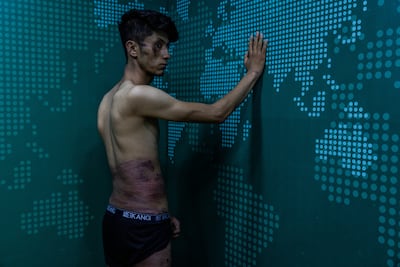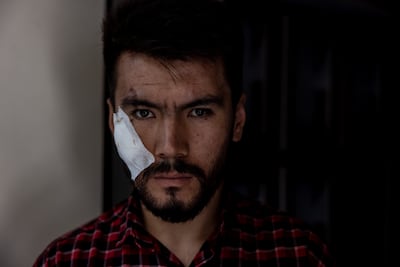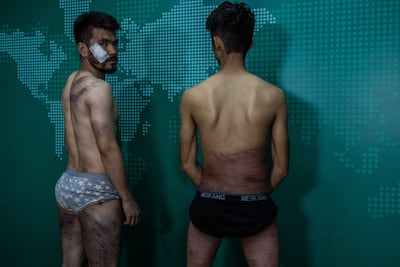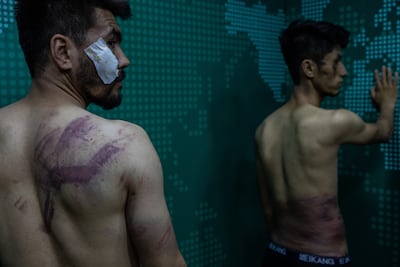Follow the latest updates on Afghanistan here
Afghan journalist Taqi Daryabi was taken into a small room at a West Kabul police station on Wednesday, and followed in by about eight Taliban fighters. He does not remember the exact number.
There, he was told to lie face-down on the floor.
Daryabi, 22, said the kicking, beating and flogging started almost immediately, and continued until he passed out.
He woke to angry men throwing cold water in his face and, as soon as he had regained consciousness, the assaults would start all over again, to be repeated several times.

He was one of two Afghan video journalists working for EtilaatRoz – one of the country’s leading daily newspapers – who were detained on Wednesday while covering a women’s rights protest.
Both of them were severely beaten, with bloody and dark blue marks left all over their bodies.
Zaki Daryabi, 33, the paper’s founder and editor-in-chief, said that after the Taliban took over Kabul on August 15, he had tried to get all of his 45 employees out of the country.
Only 10 of them made it, so Zaki Daryabi decided to stay with those who could not escape, saying he felt responsible towards his newspaper’s staff and would not leave unless he knew all of them were safe.
Taqi Daryabi, Zaki’s brother, was the first journalist to be detained and beaten by the newly established Taliban regime, the editor-in chief said.
A second man, Nehmatullah Naqdi, 28 was likewise taken into a small room and “lashed by 10 men until unconscious", he said. His back and legs are severely bruised, and his face and eye also sustained injuries.
“When they were beating me, using sticks, cables, rubber and their feet, I thought I was going to die," Naqdi said from his office a day after the assault. "The pain was unbearable. I thought this was my last day."
He is barely able to move his arms and legs, barely able to walk. Both men had been treated in hospital but have since been released to recover at home.

“I’m devastated," Zaki Daryabi said. “This is a clear attack on press freedom.”
Three other employees of the paper who had been covering the same women’s rally were detained on Wednesday, although none of them were beaten.
The Taliban have since ruled that any protest which has not been approved by the Ministry of Justice is illegal.
Activists wanting to hold demonstrations must specify the reason, time and location of the event and await the Taliban’s approval before proceeding.
Media outlets are not allowed to cover any “illegal” demonstrations.
On Wednesday, the Taliban demanded mobile broadband services to be turned off in certain parts of the city, hoping people would not be able to mobilise for further protests.

Zaki Daryabi founded EtilaatRoz – meaning "information of the day" – almost 10 years ago, in 2012. It is Known as a major investigative newspaper in the country and Daryabi last year won Transparency International’s Anti-Corruption Award.
Under the newly announced Taliban government, the paper’s employees are now wondering whether they will be able to operate freely without facing further retribution and censorship.
“The Taliban have only one way of responding to any challenges to their authority – be it from women demanding their rights, or journalists simply doing their jobs and reporting the news – and that is brute force,” said Human Rights Watch’s associate Asia director, Patricia Gossman.
"They are quite unprepared for the Afghan society they are encountering, and all the signs point to increasing repression from them, which may lead to an even bloodier crackdown.”

Both reporters say they are afraid to resume their jobs but claim that, especially now, they did not want to give up.
“Journalism is my profession; it’s what I’ve learnt and what I believe in," Naqdi said. "Of course I will continue, even if it might be hard. Journalists are now needed more than ever in Afghanistan."
